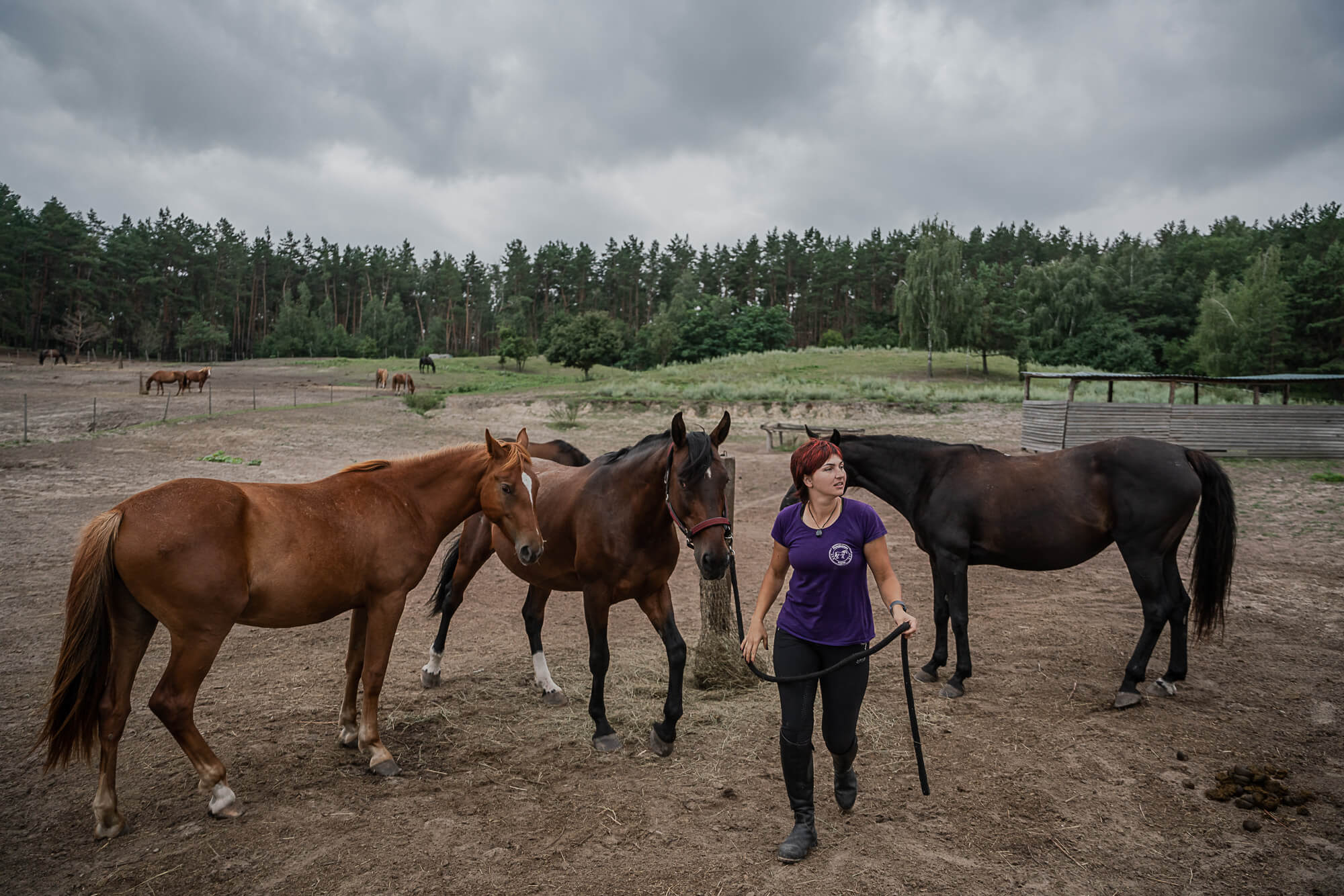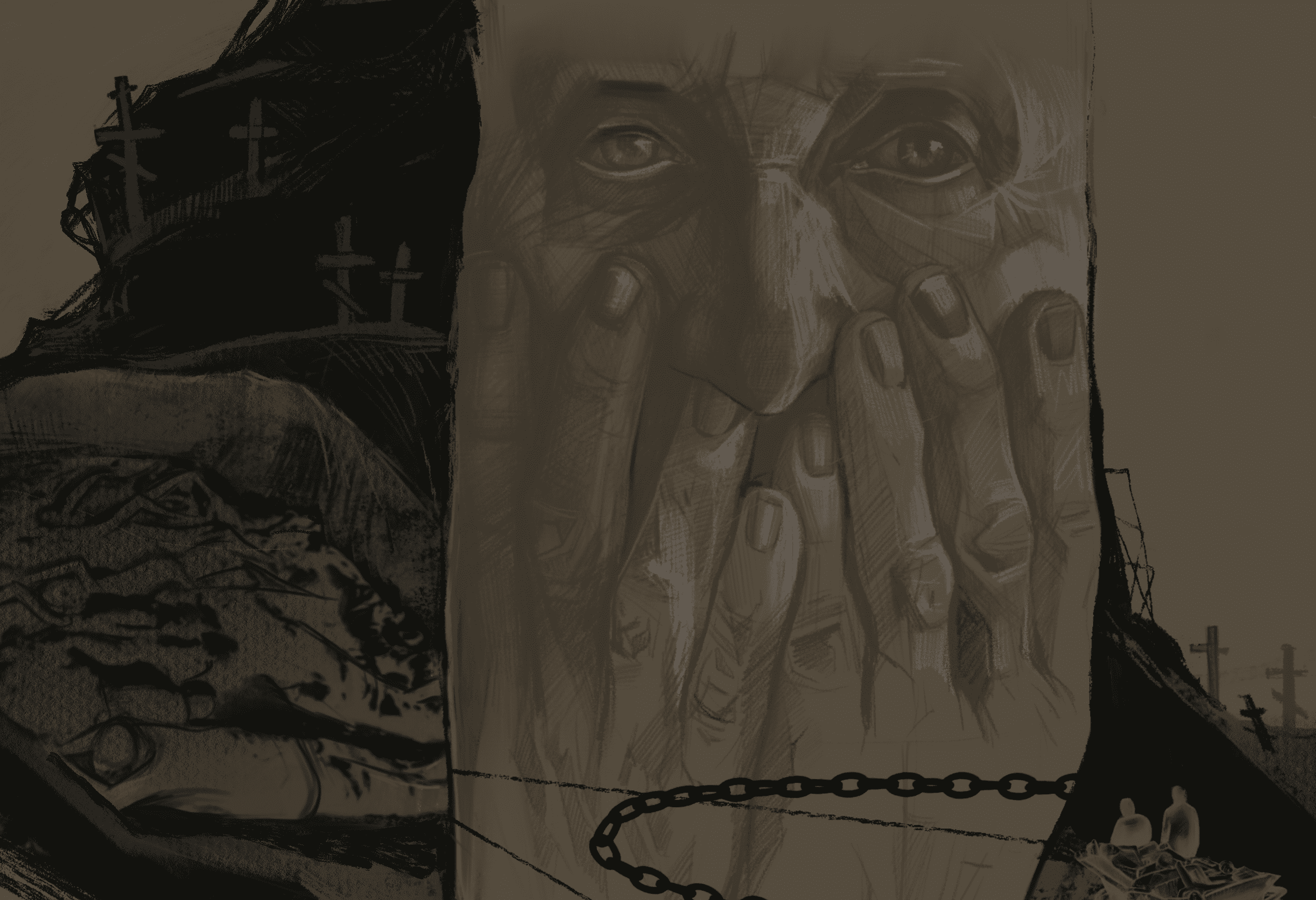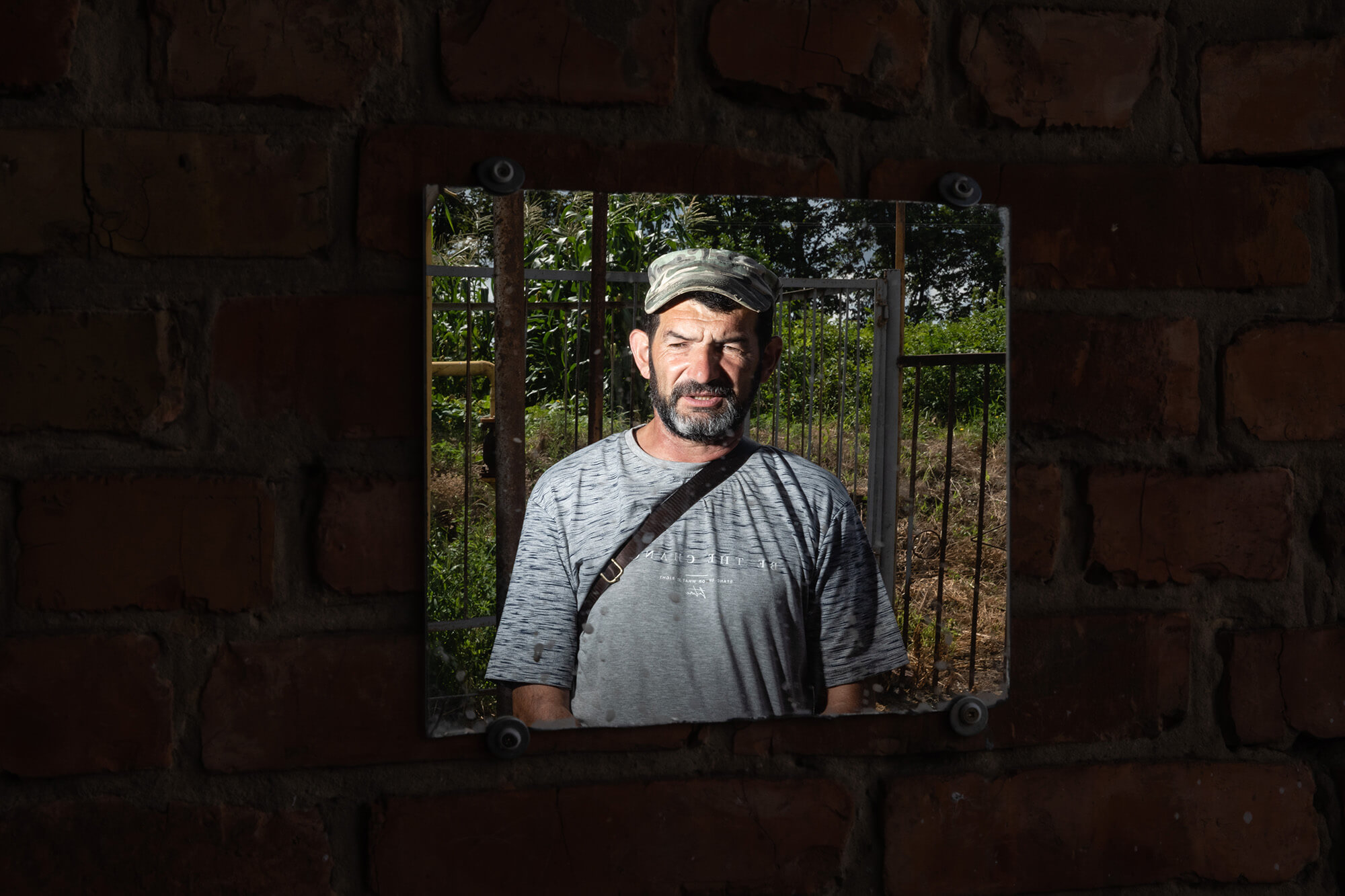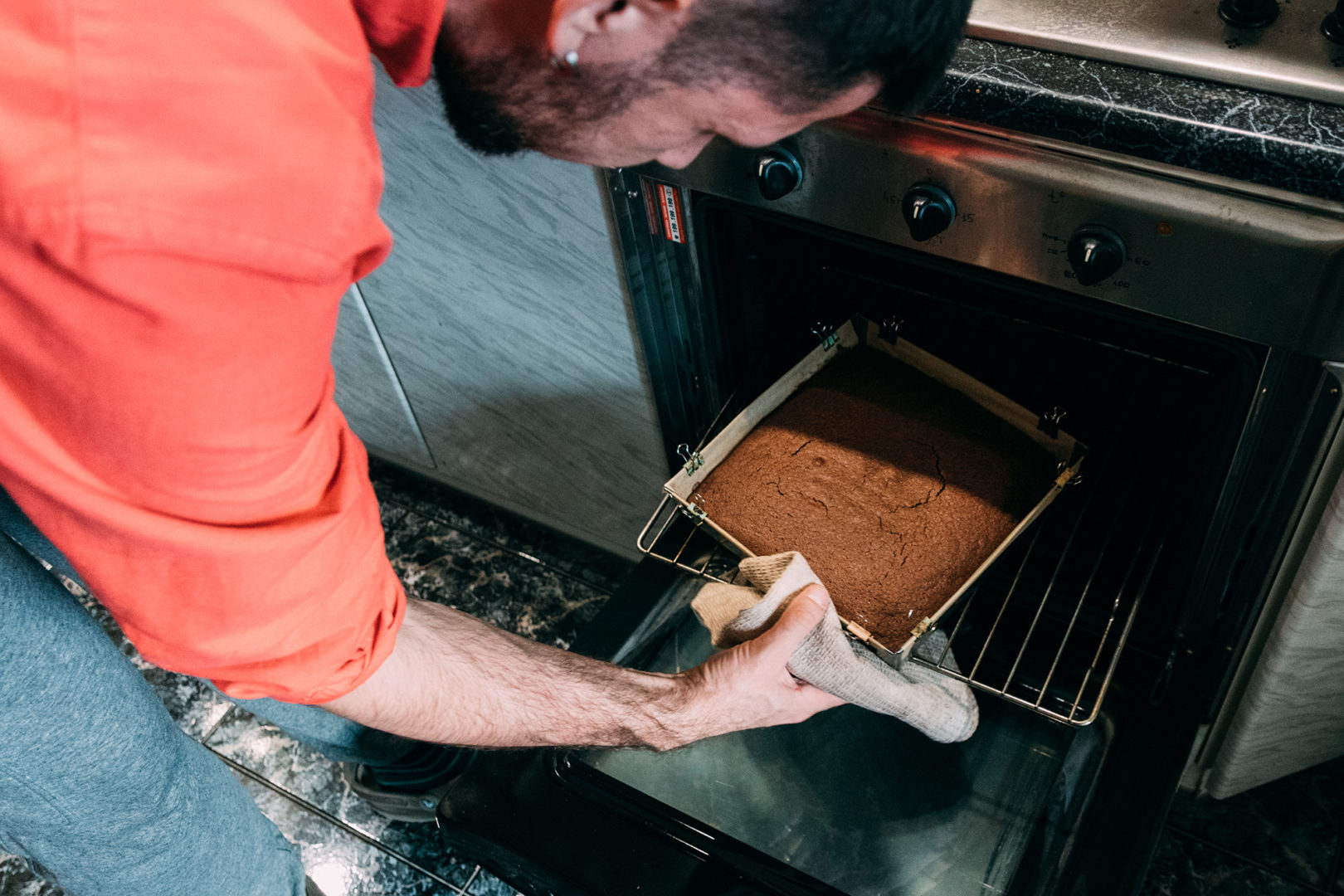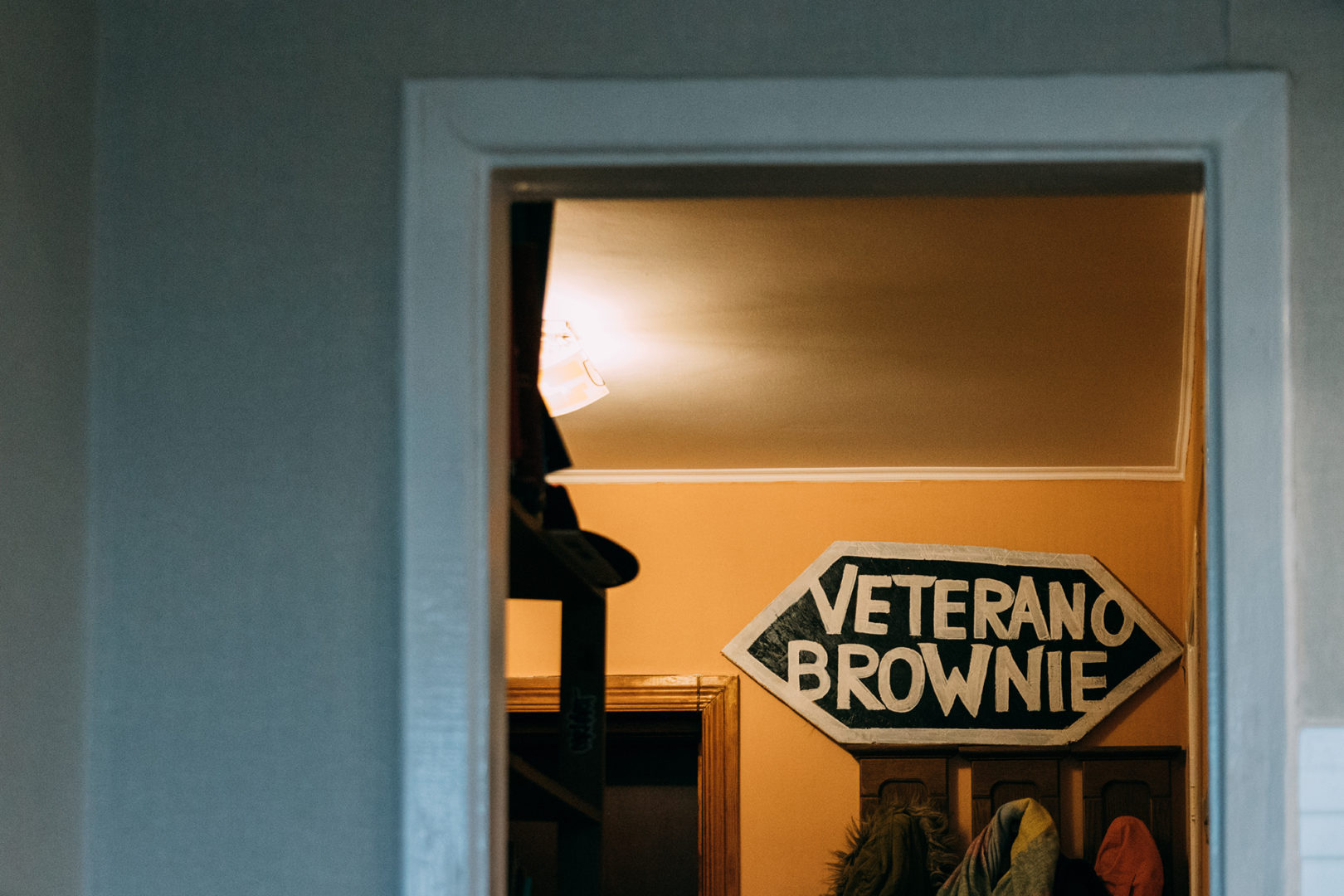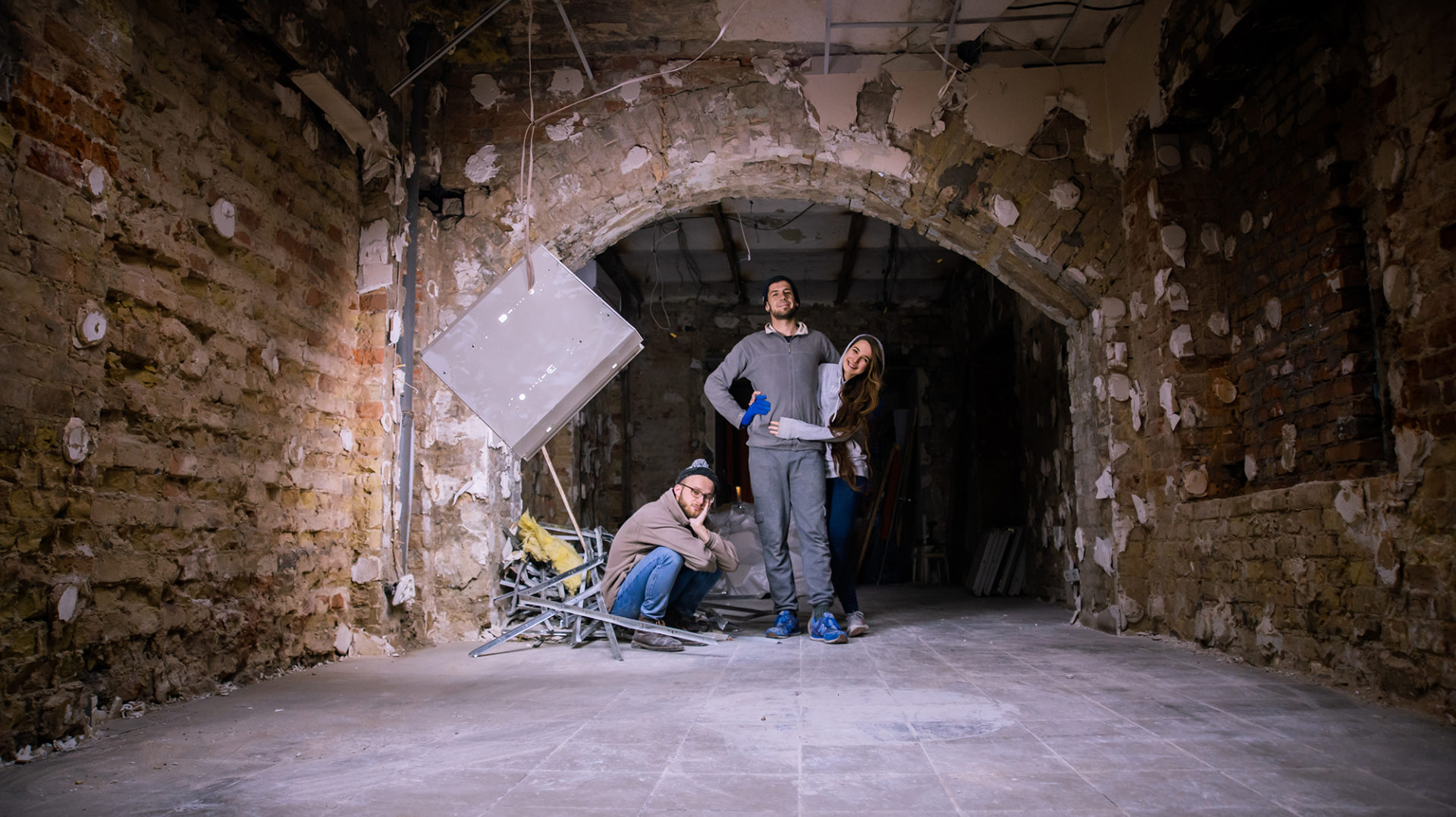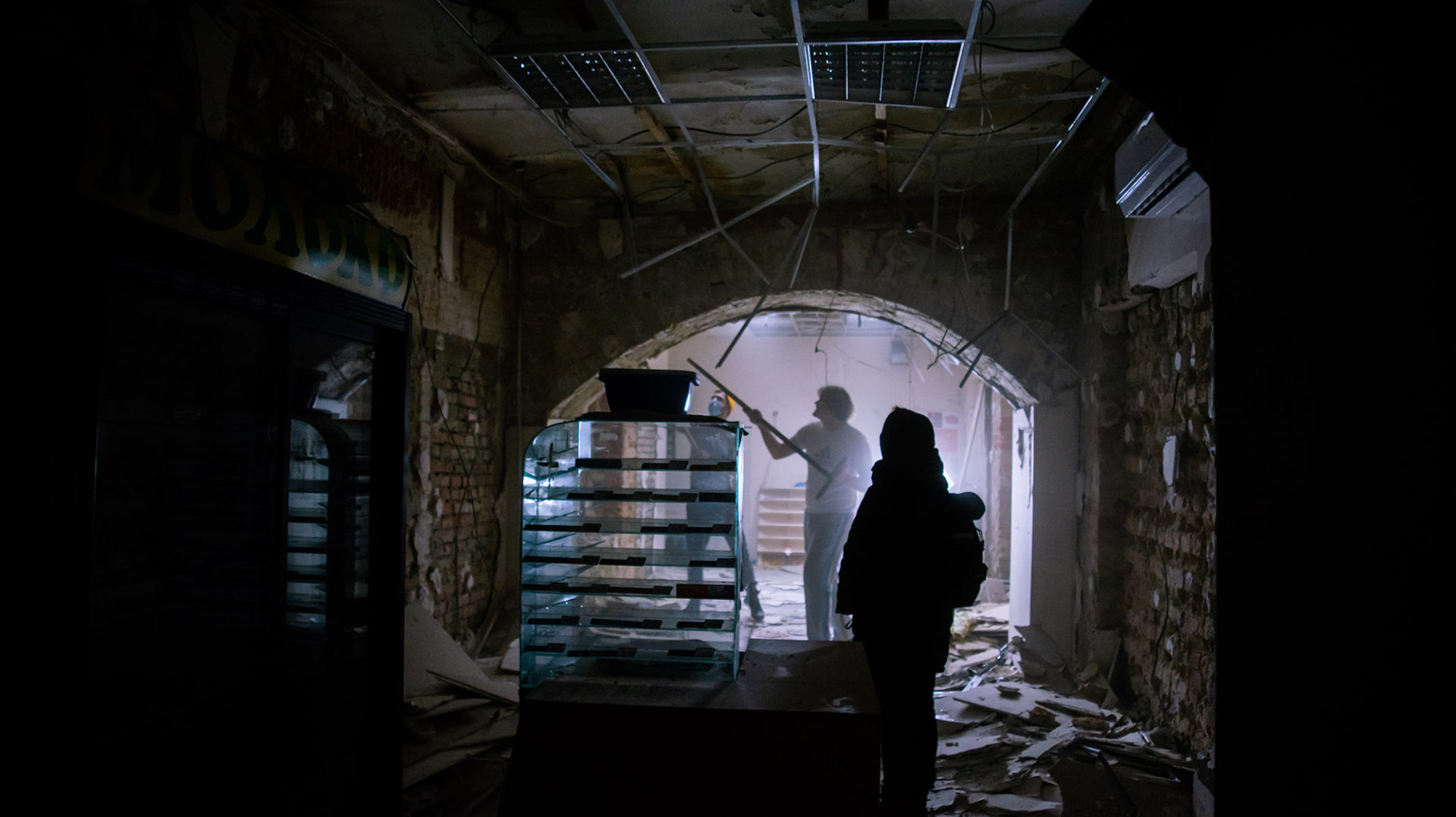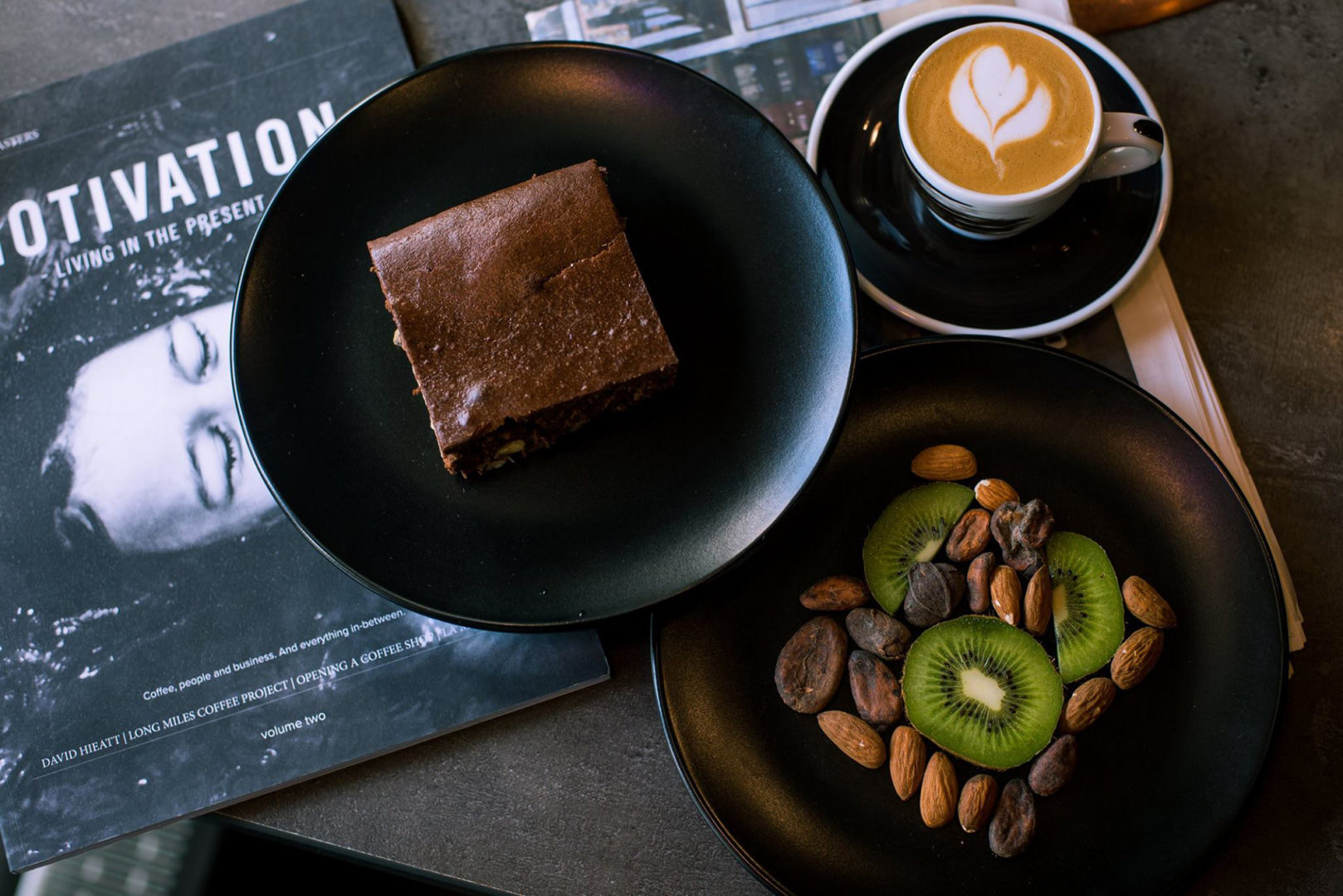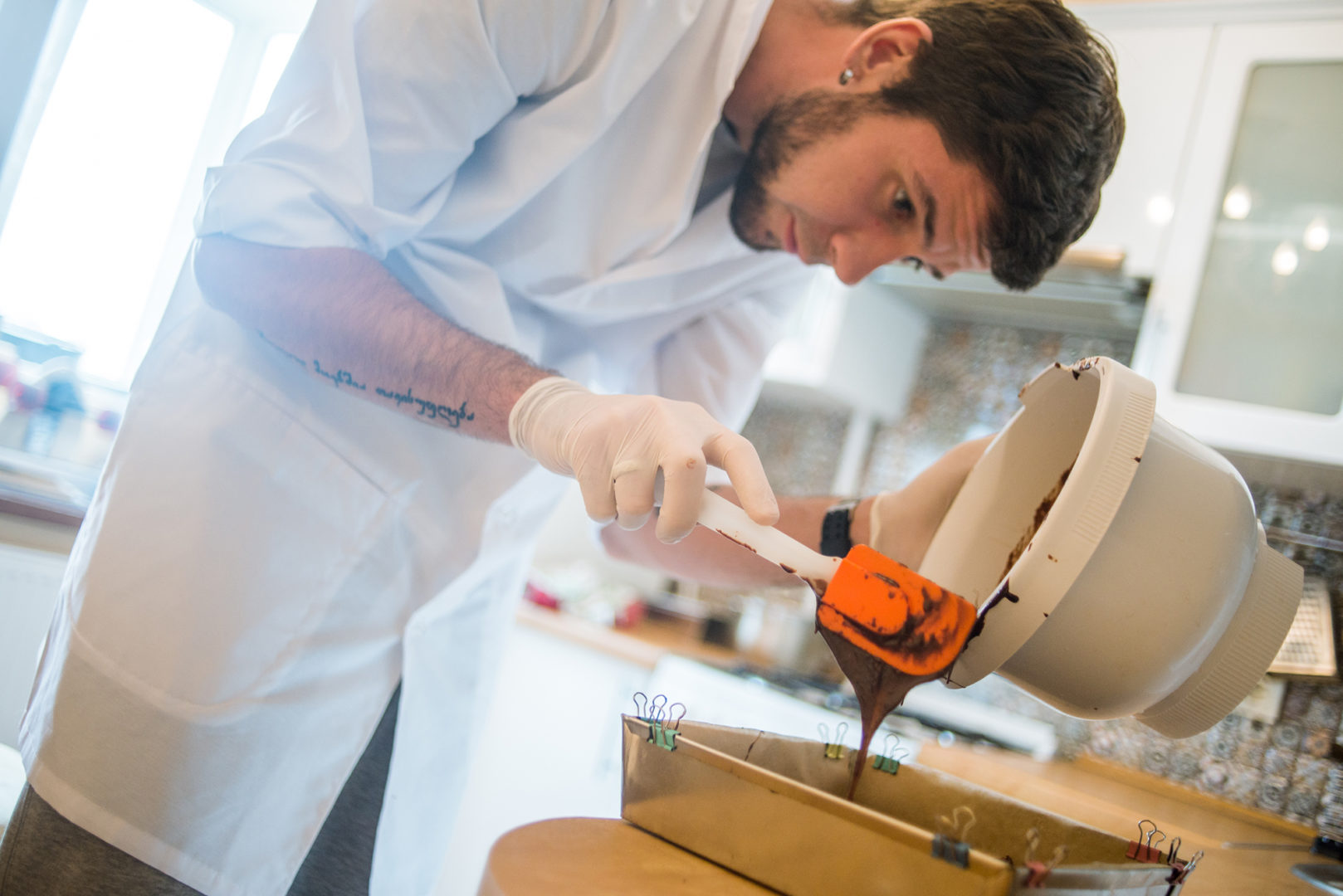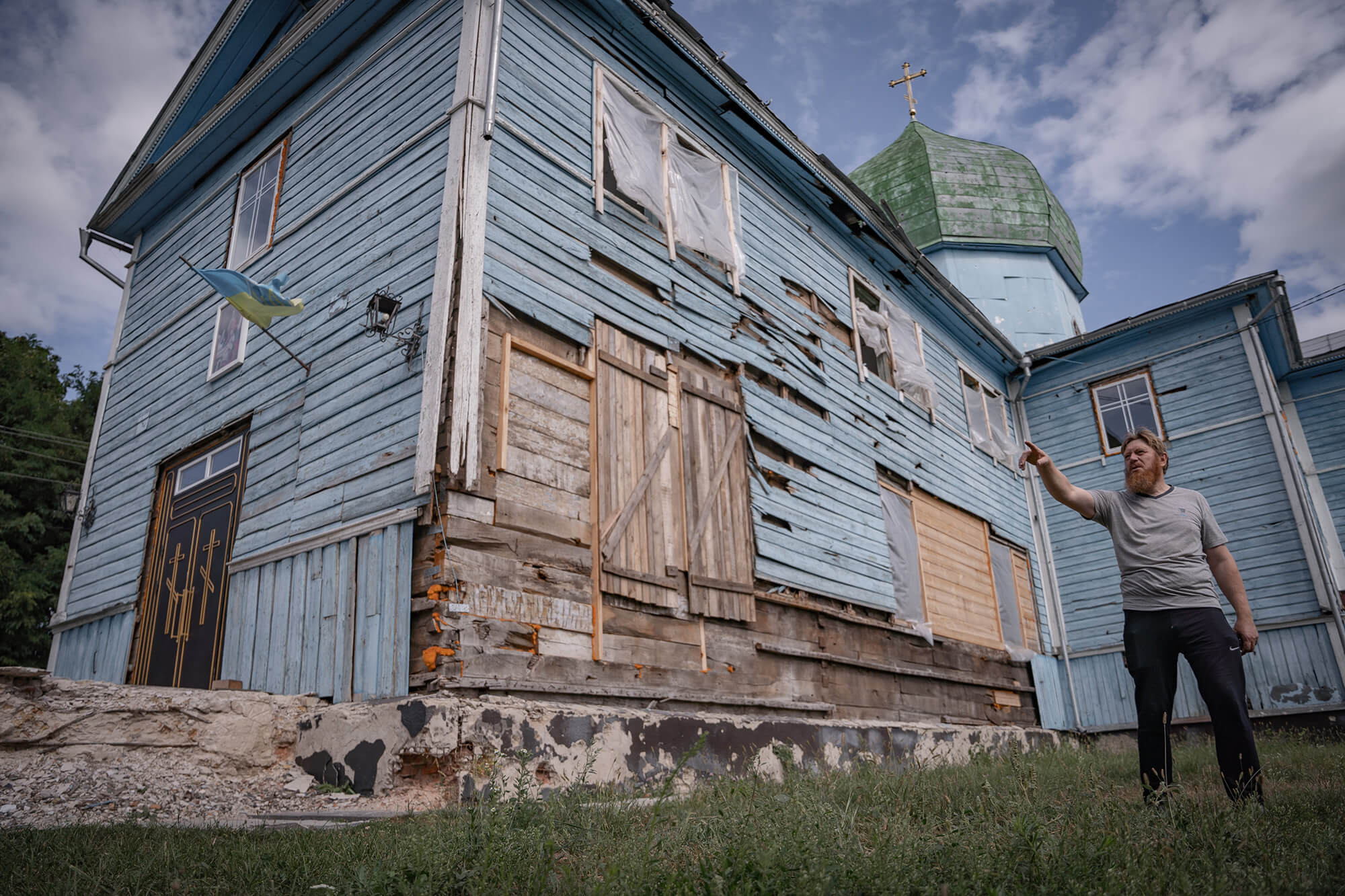
More Than a Brownie
This year, the first brownie place for veterans has been opened in Kyiv. It’s part of the Veterano business group. Roma Nabozhniak and Yulia Kochetova-Nabozhniak, the co-owners of the Veterano Brownie brand, plan on treating people with brownies in the Podil neighborhood of Kyiv and then cover other million-plus cities.
For them, it’s more than just a business—it’s a way to rehabilitate and adapt to civilian life, help veterans and displaced residents, and also show that people with war experience can be a part of society during peaceful times.
Their kitchen at home is full of baking utensils and there’s always chocolate around. The laptop with all the plans and strategies developed by Roman is on the kitchen table.
“When Roma wants to scare me, he shows me Excel tables,” Yulia says jokingly.
“Look,” he opens a file.
“Aah,” his wife laughs.
“This is a financial plan for three years,” he explains to me.
Before, there was another table just like this one with all of the brownie specifications—the height and width of the piece, the density of the dough, ingredients required along with their quantity. Now, after baking the dessert every day since March 2017, Roma keeps all of that in his head.
A short story about brownies
Spring of 2017. Yulia works at the Old Fashioned Radio. Roma stays at home while she’s working. He came back from war with a post-traumatic syndrome: he sleeps at night with the lights on to remind him that he’s at home when suddenly he wakes up with a start, thinking that he has to go on a mission; he avoids crowd, doesn’t go to parties. He needs to keep his hands busy, so he either repairs the car for the front or buys groceries at the twenty-four-hour Silpo near the house and cooks—he’s joking that he finally got ahold of decent products after demobilization, since there is no pesto sauce or buckwheat baguettes in the ATO Zone. Friends come by occasionally and they need to eat too. He cooks delicious meals and Yulia tells this to her husband constantly and almost every evening she comes back home as if for a “dinner from the chef.”
On one of such evenings, Yulia opened the apartment door and could smell chocolate before getting her keys and stepping inside. As a child, it was the only product Yulia was allergic to, so she became infatuated with it as an adult. Roma has never made desserts before, but:
“Yulia, I made a brownie!”
“What?..”
“Just taste it.”
Sounds convincing, so she leaves her bag in the hall and heads for the kitchen, where she finds a piece with a perfect and shiny crust waiting for her. Yulia tries it and:
“Yummy, this tastes so good!”
The evening passes quickly—she always gets sleepy after sweets. Though something’s gnawing her, while she’s lying in bed:
“Roma…”
“What?”
“Are there any more brownies left?”
“I made one kilogram,” Roma purrs from under the blanket.
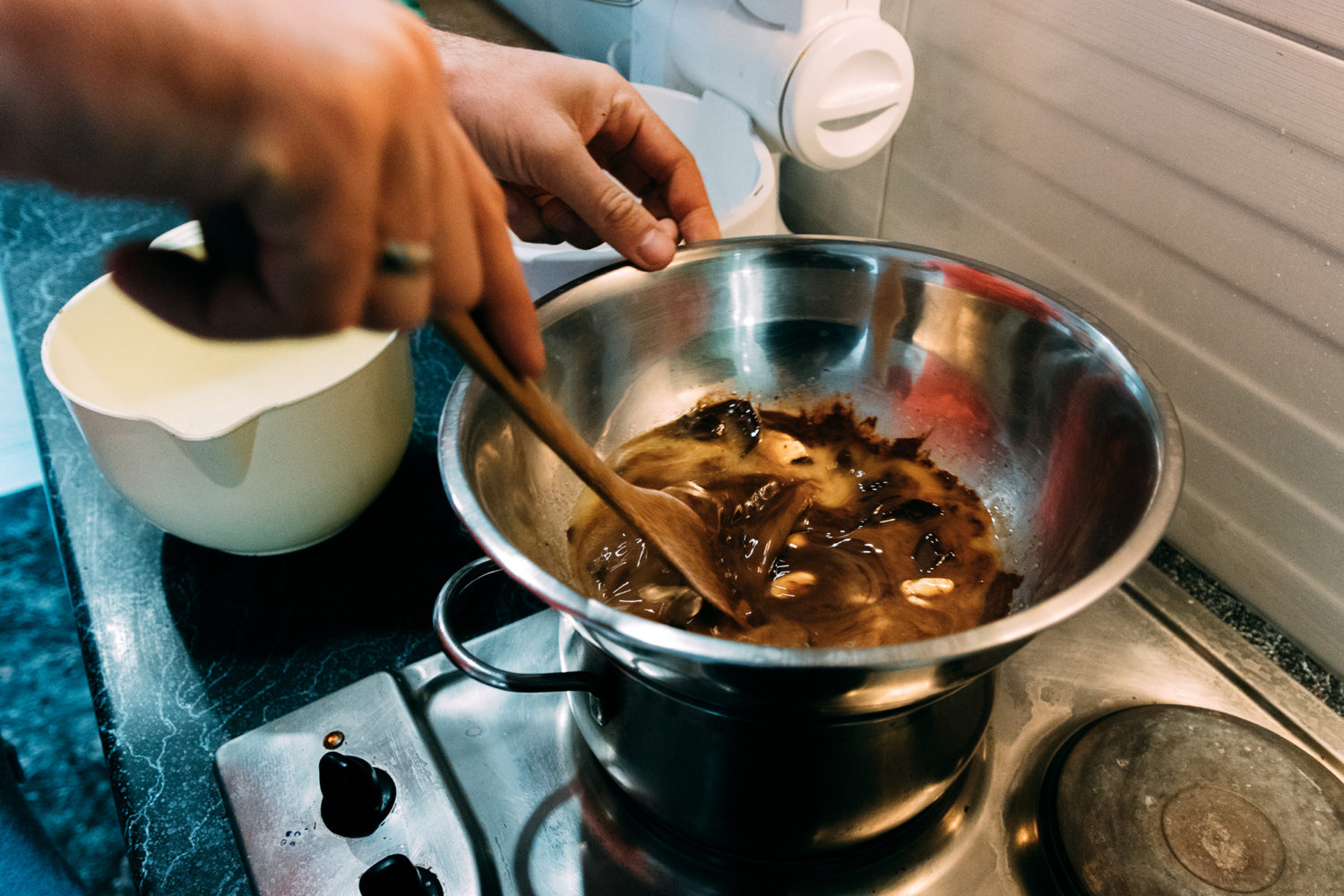

The brownie didn’t live to see the beak of dawn. Yulia and Roma were concerned that they might feel sick after eating a kilogram of sweets, but no—the dessert passed its first test with flying colors, meaning that they could invite friends over “for a dessert.”
Everyone loved it. Pretty soon there wasn’t anyone left among their friends, who hadn’t tasted those brownies. So what’s next—just turn it into a specialty dish? The tip came during one of their friendly gatherings. Yulia’s friend Miriam and her daughter tried the brownies and suddenly:
“So delicious! Have you thought about selling them?”
Selling brownies? The idea took on practical meaning after being voiced by someone else. Roma and Yulia had no reason to refuse—”why not?”
A slightly longer story about the business
Roma and Yulia were standing in front of the doors of an around-the-clock hypermarket at 1 a.m. with egg cartons. What passed through Yulia’s mind was, “Is this what having your own business looks like?..” Two first boxes were to be delivered in the morning. Orders rained down the moment Leonid Ostaltsev, the founder of the Veterano Group, posted Roma’s photo and explained that Roma is starting to bake brownies. Orders were coming through comments, direct messages, e-mails—Yulia didn’t even have time to create a Facebook page.
When Leonid said, “bring them in the morning,” it disrupted all plans—neither Roma nor Yulia thought that all of this would happen so fast. In the morning, she was signing first boxes already, one of which went to Troieshchyna. Yulia delivered the other one to Kurenivka, where an unfamiliar man met her—in a year, the same man approached her at the Vsi.Svoi festival, also for a box of brownies.
“We have suspended brownies—someone pays for them and we’re delivering them to hospitals, guys and girls from the military are admitted to. Not long ago, we’ve seen the first guy we brought those brownies to—back then he was recovering after an injury and when we met him again, he was healthy and looked good. That’s when we realized that our story is not about brownies or food, but about important things of value and it’s hard putting them into words.”
Caramel. Banana. Cherry and Dorblu. Roma cooks all of this on his own in the kitchen. His record is 37 kg of dessert in one day. Before that first kilogram, the man never even tried brownies. There is no rational explanation why two years ago he decided to cook this particular dessert—Napoleon seemed too complicated, the cheesecake was incomprehensible, and everything seemed fairly simple with brownies.
Everything related to recipes and finance in business is Roma’s job, while Yulia handles communications.
“People find it hard to understand this pattern,” she says. “I was infuriated when at first journalists referred to me as Roman’s wife. I am a business partner! You thump yourself in the chest with tales about women’s leadership, when it’s easier for people to share stories about applied things: like he’s a cook and he’s cooking, and she is the wife and she’s smiling. Or he defended his motherland and she waited for him. We are adults who just wanted to create something.”

Roma wrote the initial business plan during a trip to India: home production was supposed to be the first step, then a workshop, and only then their own establishment. The work was based on a simple principle: buy chocolate, “slam-bang,” as Roma puts it, make a brownie and sell a brownie. However, after the first ton of brownies, they realized that the time has come to move forward. It turned out that the workshop wouldn’t pay off, but the couple knew from their experience of participating in Vsi. Svoi markets that they had stable sales a few hours before the end, so they ought to go straight to retail sales in their own establishment.
“When the subject of the brownie place came up, we realized that we needed bigger investments. Both me and Yulia aren’t particularly fond of loans, but in this case, it was something we couldn’t do without. I didn’t have enough knowledge in the field of finance, so I went to study at the KMBS restaurant management school. At the same time, I studied at the Kyiv School of Economics on a special program for veterans, where they told us how a healthy business works. During my studies, I developed a business plan for a real brownie place project and received first support on pitching.”
Yulia says that the program at the Kyiv School of Economics really helped with adaptation after returning from the frontline.
“Ukraine as a state had a bit of a Soviet approach to adaptation: privileges for public transport, utilities, land property. However, when someone returns from war, they don’t need discounts on heating bills—they need support, a system of adaptation to peaceful life and opportunities. Land can also be viewed as an opportunity, but we know from experience that this system does not work. What’s required is something like that educational program, when you are provided with knowledge, a community, role models, and even better—investments.
We invested our own funds, loans from friends and banks, as well as contributions from the crowdfunding campaign into the brownie place. We planned on fitting the latter into a few months, doing mailouts, cooperating with media and opinion leaders, but we didn’t have to—23 founders out of 30 were found in a day. After a few weeks, we gathered the necessary amount. Neither Roma nor Yulia expected this. Each of the 30 founders contributed USD 500 to the development of the brownie place. For this, they get unlimited free coffee in a signed cup, a lifetime free brownie for their birthday, a corporate discount for a project or the office and the right to be the first ones to taste new flavors during their development.”
“Only veterans and displaced persons work in the brownie place—a sort of a positive discrimination. I won’t be baking anymore, since I’m engaged in business development together with Yulia. If you plan something, you need to have the highest possible skyline.”
“We want to open establishments in million-plus cities: Lviv, Odesa, Kharkiv, Dnipro…”
“Donetsk and Sevastopol.”
For Roma and other veterans, the Veterano Group business is not just earnings or a favorite job, but also a reputation: both personal and of the community. Their mission is twofold: on the one hand, to help veterans adapt to life through their own business, and on the other, to show the society that veterans are people who want and know how to work efficiently and that they are more than beneficiaries in a form of a social burden. In addition, 10% of the Veterano Brownie profits go to the fund to help families of those who were killed in the war. Roma says that one of their principles is that nobody owes them anything. The main point is to trust each other.
A long story about coming back home
“Listen, the next question will be a trivial one,” I warned.
“Did I kill people?” he laughs, sets the timer for brownies and leans on the table.
“No, even more trivial,” I’m laughing too. “Why did you go?”
“I went, because I couldn’t do otherwise. I can list 150 reasons, but the only right one is that I couldn’t stay here any longer.”
Before the war, Roma worked in digital advertising, was an analyst at a creative agency, taught English and mathematics to children, worked in an IT company. During the Maidan, he was part of the student movement and self-defense. When the war began, he could not sit still, so he went to the recruiting station during the second wave of mobilization. In six months, having completed the training and examinations, he went to the east—he spent 10 months in the Mariupol and Luhansk tactical force sectors, and altogether the service lasted for 14 months.
Yulia ended up in the east before Roma did. She is a journalist and a director. She was also on the Maidan and took pictures there. When the little green men appeared in the Crimea in 2014, the girl worked on the news feed and studied at the Institute of Journalism of the Kyiv National University but left everything and went with her friend to the occupied peninsula to take pictures. Upon returning, the first conflicts in the Donbas began and Yulia decided to go, however the editorial office wasn’t willing to take that risk. Then she received her diploma, quit her job and went blindly to the recently liberated cities of the east.
“I arrived at Lysychansk a week after its liberation. It was August—the city was filled with pain, despair, it was completely different from what I saw in the media. I had no contacts—I arrived nowhere.”
Then there were a few more trips with colleagues and volunteers, a movie about children living on the demarcation line. Yulia told about her experience in the conflict zone at the National Geographic photo camp and at workshops.
“My first trip was completely illogical and inadequate from a professional point of view. During Maidan, my ex-boyfriend gave me a book with reports from hot spots and I remember one phrase from it, ‘If you have a task, then go and do it professionally and efficiently. If you do not have one—do not tempt fate’.”
Yulia went to the Institute of Mass Information, where free bulletproof vests were being given to freelance journalists. The guy who helped her try on the vest told how the day before a colleague returned with a vest just like that one, only with a splinter stuck inside, and then he kissed everyone and thanked them for saving his live. The vest was way too big for Yulia.
“I have seen many people whose vests and uniforms were too big for them. It’s like a metaphor—the young face of the war, which did not fit us back then. All these vests, all this experience, which we put on ourselves—consciously or unconsciously—were too big for us and we were stretching ourselves too thin. This is something that will keep reminding us of itself with traumas, psychological disorders and burnout people not only in the conflict zone for a very long time.”
When Yulia returned from Lysychansk in 2014, she went to a party at the Kyiv-Mohyla Academy, which is where she met Roma.
“We were just two people in the circumstances of time.”

They discussed him going to war after they started dating. Roma left in a couple of months. Whenever possible, they wrote to each other and talked. Roma was always the one to call—Yulia knew that she might call at a bad time. Calls were from different numbers, but she saved them all and wrote warm messages to the front. One day, after Roma’s return, a funny story happened: Yulia needed to call him urgently and dialed one of the saved numbers in a hurry—it wasn’t Roma who answered. It turned out that it was his comrade, from whom Roma borrowed the phone to make the call. He was the one who received all those messages, not Roma, but he didn’t confess at the time—they made it easier for him to be there.
Yulia made a movie about her relationship with Roma at the distance of war—the premiere took place on the Docudays.
They bought tickets for Jazz Koktebel in August 2015 in advance—it was the festival they went to together a week after the beginning of their relationship and they wanted to repeat that romantic experience. Roma was supposed to be demobilized before August, but he didn’t manage. He called Yulia and said that there are two options for getting an additional leave: either going to a funeral or a wedding. While Roma was at the front, Yulia went to the registry office.
As she thought, there was commotion all around her—operators, photographers, couples making selfies and kissing on camera with rings on the foreground. A woman approaches her with a flyer—Wedding photographer, wedding horses, wedding embroidery. Yulia is sitting there like a truly untargeted audience: alone, irritated by this spectacle, as if coming for a divorce, but the woman still gave her several flyers. Finally, it was her turn to come in.
“Where’s your fiancé?” asks the prototypical woman pretentiously.
“If I tell you, you’ll get in trouble—he serves in intelligence,” Yulia calmly replies.
The woman shuddered.
“I cannot accept your application.”
“Resolve the issue, it’s your job,” Yulia insists.
In a few days, Roma sends her a power of attorney via the Nova Poshta postal service stating that Yulia can submit an intention of marriage in his name. She goes to the register again and it finally gets accepted. Next time they went there together—just for a signature, without any festivities.
“Don’t you want to go into our hall? How about the wedding march? A ceremony? It’s a once-in-a-lifetime experience!” the woman couldn’t let it go.
But neither Roma nor Julia wanted a march and they didn’t want to go into the hall. It was Saturday and both of them had more than enough of the atmosphere of the most solemn day in life: lots of couples, videographers, photographers, parents, children, limousines. They took a photo against the background of other couples, as if holding them in their palms, and then entered a small room, which had nothing solemn about it whatsoever.
A girl reads the text on autopilot, they place their signatures and… that’s it.
“Have you exchanged rings?” the bridal pair gets reminded.
“Oh, right.”
Accompanied by the wedding march, they leave the room and another couple leaves the celebration hall at the same time as they do. Roma and Yulia get into an olive Lanos taxi and go to a Georgian restaurant—now they can go and listen to jazz.

The honeymoon trip was real, though. Roma was at the front on the day of Yulia’s birthday, so he asked a friend to give her his gift—tickets from Kyiv to Kathmandu. She opened the gift envelope and thought that it was some kind of madness: she just received her employment record book at the Old Fashioned Radio and six months later she’s flying to Kathmandu.
Roma didn’t choose this direction out of the blue: he watched an episode of Orel i Reshka about Nepal once and offered Yulia to go there.
“I hope that all of the school geography competitions I took part in and even won will forgive me, but back then I didn’t quite understand where that is exactly…”
“Petro Yatsyk mode,” Roma teases.
“…either way, I said, ‘Sure, let’s go to Nepal’.”
Roma returned from the east. There was time left before the trip and he decided to repair the car and send it to the front—together with Yulia and his IT company, they helped buy it and the car served the allotted time at Roma’s subdivision, but after his demobilization the car had to be repaired and he wanted to make sure that it won’t stay in the rear to be used by generals.
They delivered the car together. Roma wasn’t familiar with the territory. They were driving in the morning, surrounded by the Luhansk fog, which was so thick it seemed you could cut it with a knife, zero visibility. And suddenly the outlines of the checkpoint emerge from that winter darkness. At that moment, Yulia enters the NSDC website from her phone, where the line of demarcation is being constantly updated on the map.
“Oh…”
Not far from Krymske, they were driving right on the line, which coincided with the road. There were two flags on the car—one in red and black and the other one in yellow and blue colors. Completely confused and shocked men were looking at them from the checkpoint—it turned out that they were ours, but nobody visited them for so long that for quite a while they couldn’t understand who’s coming.
The military pointed the right wa —the car turned around and went downhill. At a decent distance from our checkpoint, the front-wheel drive got disconnected, but they had to dart past the place where they could get shot. They stepped on the gas, the car turned around on ice and got stuck on a slope—in the line of sight of the enemy. Roma stays behind the wheel, his comrade Mykhas sprints out of the car and pushes it, and Yulia sits in the cabin and thinks that if anything bad could happen, it would happen right there and then: they are supposed fly to Kathmandu for their honeymoon in two days and here they are in the Luhansk region, pushing the car out of the skid while hearing the echo from shelling. In the end, help arrived. The car was delivered to the destination and it was all over. They took a taxi to Lysychansk—the driver charged them with UAH 600 and threw angry comments all the way there, “Why the hell are you even here?” Two days later they were far from here—they flew to Kathmandu.
“We completely tuned out the informational space. It was an opportunity to reboot the brain and switch to other impressions, events, tasks—for example, counting to make sure that the Nepalese weren’t double-crossing us while exchanging dollars.”
Roma and Yulia completed two tracks in one month: one for 3,200 m and another for 4,985 m. That turned out to be enough and they flew to India from Kathmandu. Despite the fact that he was always welcome and supported, Roma realized back then that he doesn’t want to return to office work. In Nepal, there were no familiar sweets, so they went to Starbucks in New Delhi and there they saw a brownie that reminded them of their home cooking experiments. The picture finally became whole in Goa—there was normal access to the Internet and Roma saw Leonid Ostaltsev’s announcement about his willingness to aid veteran business. Roma wrote the first business plan on the island. After 2,5 months of travels they returned home and received first orders.
In the autumn of 2018, Roma and Yulia settled in a new apartment. Their home is filled with paintings, photographs, books, vinyl records (first pressed ones from travels in Europe), a Zenit film camera, which belonged to Yulia’s father. The first picture she took was her father’s portrait when she was five years old—and she hasn’t let go of the camera since then. Their house always smells of chocolate—Roma makes brownies every day. He melts the chocolate, cools it, adds the necessary ingredients and sets to bake—the timer counts down the time, so you can hear the tick-tock-tick noises coming from the kitchen at all times.
While still at war, Roma realized that he should stop hesitating with music. Before going east, he had his own band, but shut it down.
“I always said, ‘I work in IT and I also have a band.’ At the front I realized that this is something I can’t live without. When you’re engaged in destroying for a long time, at some point an inner need rises to create and renew. Both business and music are about creating.”
After launching Veterano Brownie, Roma took up an old dream. At first, he pasted up notices at music schools, wrote to musicians and managers he knew and those he didn’t—before the war, hearing a refusal was frightening, but the front leveled down all of those fears. When all members were found, the DVIZH PARYZH band appeared. They gave the program written before the war another brush, improved it. Roma participated in the Voice of Ukraine but didn’t reach the final. However, thanks to his participation the band formed a core audience—they gave several concerts for a stable full house. Now they are preparing to record new singles, and an album and a video are in plans for 2019. Roma says that the guys in the band work well together, because they have a common vision—they play in various projects, but can truly fulfill their potential only in DVIZH PARYZH, even if it might seem to someone that it’s not the format.
Despite the family, business and music, Roma is ready to return to the front. He is a part of the first stage operational reserve and will have 48 hours to appear in the recruiting station if necessary. He was almost taken to training once—during the joint Belarusian and Russian military training. However, it turned out that it wasn’t necessary to go and there was no real threat.
“I was just angry at everyone back then. I sat in the apartment and thought, “What the hell? We want to build something, why on earth are they pulling us out of this life?”
However, Yulia knows that the war will not end while the military at the front and activists in the rear are being killed.
“It won’t end until we win,” Roma clarifies.
When in a crowd, he still thinks on the fly about ways to lead people out in case of danger, who to save first, remembers signs whether a person will live after being wounded. He grew unaccustomed to people in civilian clothes, but he is not angry that they were here while he fought.
“I fought at war so that everything here was OK. If the people here are OK, then why should I be angry? This means that I did a good and efficient job.”
Roma checks occasionally how much longer the brownies should be baked.
“I am not an adherent of dramatic hand-wringing, because our boys are being killed. However, there’s also no need in going too far and saying that we are just pawns in the games of politicians—that’s something I’d like to slap in the face for. Those who decided to go should be respected. Everyone has the right to be afraid and it’s no good sending everyone to the front. There is no such thing as a cult of militarism in my family, I once deferred from service and staid during the first wave of mobilization, but in the end I went to war because I knew I had to. I understood that I had to return, and I always tried to remember that.”
“Roma, why did you make it back? In every meaning.”
“Turn your head to the right,” he says, barely audible.
I do. Yulia is sitting there. We remain silent. They’re smiling.
The timer counts: tick–tock–tick.

Translated by Ali Kinsella.
[This publication was created with support of the Royal Norwegian Embassy in Ukraine. The views and opinions expressed in this publication are those of the authors and do not necessarily reflect the official position of the Norwegian government].
Have read to the end! What's next?
Next is a small request.
Building media in Ukraine is not an easy task. It requires special experience, knowledge and special resources. Literary reportage is also one of the most expensive genres of journalism. That's why we need your support.
We have no investors or "friendly politicians" - we’ve always been independent. The only dependence we would like to have is dependence on educated and caring readers. We invite you to support us on Patreon, so we could create more valuable things with your help.
Reports119
More

